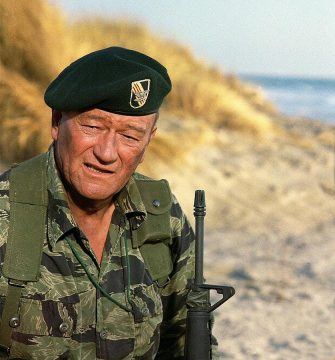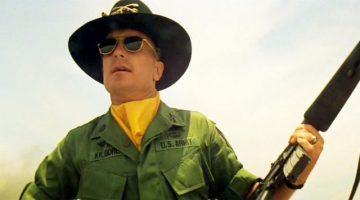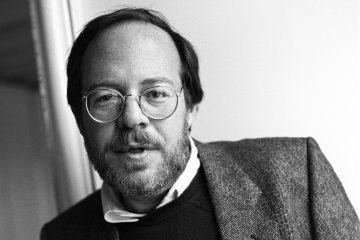by Robert Fay

During the annus horribilis of 1968 when it became clear the U.S. would never “win” in Vietnam, John Wayne decided to star and direct in a propaganda film called The Green Berets. Wayne was a die-hard Orange County anti-communist who believed that the U.S. military was winning on the battlefield in South Vietnam, but losing in the media and public relations realm.
Rather shrewdly, Wayne centered his film on the U.S. Army Special Forces, a.k.a. the Green Berets, whose small 12-man A-Teams lived and trained with the anti-communist Montagnards, the indigenous peoples of Vietnam’s remote central highlands. The Green Berets in the 1960s were an all-volunteer, highly-selective outfit with both mystique and a bit of holdover, Kennedy-era glamour. These teams spoke the local languages and formed close and often lifelong bonds with their Montagnard peers. This mission profile remains to this day the classic Special Forces game; make contact with local populations and then fight alongside them against a common enemy.
If John Wayne had depicted the typical American military units in Vietnam, main-line U.S. Army or U.S. Marine Corps infantry troops trudging through rice fields—even with all the hilarious puffery of Hollywood special effects—he’d have had far-less glamour to work with. These units were often filled with draftees who went out on company-sized operations supported by massive amounts of artillery and air support, some of it indiscriminately unleashed upon the countryside. There were generally no Vietnamese speakers among the troops, and the cultural and historical knowledge (e.g., of the recent Indochina War between the Vietnamese and the French) was nil.
The civilians naturally feared the Americans because of their firepower, and the U.S. troopers returned the sentiment, because they could not distinguish between combatants and non-combatants, since the Viet Cong guerrillas wore the same peasant clothing as villagers. At its worst, this combination of anger, fear, confusion, hatred and profound ignorance led to evils like the My Lai massacre in 1968, were U.S. Army soldiers murdered upwards of 500 unarmed Vietnamese civilians.
This is not, of course, what John Wayne depicted in The Green Berets, were the atrocities are naturally committed by communists, and the American Special Forces soldiers come off as big-hearted UNICEF workers who happen to carry M-16s, wear tiger-camouflage battle dress and occasionally mow down hordes of robotic Orientals.
I first saw the film sometime in the late 1970s on broadcast television. I was around nine or ten and the film had a profound effect on me. It was the first time I’d been exposed to the idiomatic (and now iconic) language of the Vietnam War: “Charlie,” “Hughey helicopters,” “The VC,” and “punji sticks.” I found it fascinating. I wanted to know more, and started seeking out books on Vietnam.
This wasn’t my first pull toward the subject of war; I’d seen several classic World War II movies by then and I had a juvenile reader on the U.S. Civil War. I can still remember a colorful graphic of Confederate soldiers in their gray tunics laying behind a stone wall and firing at unseen “Blue Coats” at Shiloh. The Rebels are surrounded by their dead colleagues, who are covered by Tennessee peach blossoms shot off by Yankee rifle fire. Even as a boy, I intuited that horror and beauty might just be intertwined with war. The gray uniforms stained with crimson blood and dappled with gorgeous pink flowers, was something out of a Jean Genet novel, something mysterious and grand. I was intrigued.
*
Through my adolescent years, I read good and bad books about war and military history. I watched all the great movies about Vietnam, the classics: The Deer Hunter, Apocalypse Now, Platoon, Full Metal Jacket and some lesser ones, Casualties of War by Brian De Palma (a play-like film with Michael J. Fox and Sean Penn), Hamburger Hill, Uncommon Valor, as well as a CBS television series Tour of Duty that ran from 1987-1990. Whether they were works of art like Apocalypse Now or silly hero films like Uncommon Valor, all these productions had a common theme: the Vietnam War was tragic and wounding, yes, but also kind of fascinating, almost cool.

In adolescence I also developed a burgeoning literary habit. Along with gorging on war books, I read Thoreau, Kerouac, J.D. Salinger and Emerson. I knew what good books were, and my two worlds eventually merged in college when I discovered The Things They Carried (1990) and Going After Cacciato (1978) by Vietnam veteran Tim O’Brien. They are hands-down the two greatest books of fiction about the Vietnam War. I also discovered the war memoir A Rumor of War (1977) by Philip Caputo—actually made into a low-budget, but largely decent television movie featuring the great Brian Dennehy playing a grizzled Marine NCO.
But there is really only one war book, both for the Vietnam War, and perhaps for all ages, all wars, and it’s by a middle class Jewish boy from Kentucky. One day, when we abandon the publishing industry’s harmful practice of dividing literature into artificial categories, we’ll classify Michael Herr’s Dispatches (1977) simply as literature, and readers will look back on the late 20th Century and group it with other great American works of literature from the era, such as like Gravity’s Rainbow (1973) by Thomas Pynchon and A Scanner Darkly (1977) by Philip K. Dick.
Herr was a war correspondent in Vietnam—and if you’re 35-years-old or younger—he is likely the best American writer you’ve never heard of. Whether you have read Dispatches or not, if you’ve seen Apocalypse Now and Full Metal Jacket, you have heard his words, because both Francis Ford Coppola and Stanley Kubrick wisely relied on him and his book to inform their scripts.
During the war, Herr based himself in Saigon where he’d smoke joints and listen to Bob Dylan and Jimi Hendrix with photojournalist pal Sean Flynn, who was the son of actor Erol Flynn. Flynn was fearless, talented and a bit crazy. He disappeared in Cambodia in 1970—still chasing the adrenaline high—where he was captured by Khmer Rouge soldiers and presumably executed.
Herr generally went where the fighting was the worst. This meant, more often than not, catching helicopters up to I Corps, the portion of S. Vietnam closest to N. Vietnam and the DMZ, which was the responsibility of the U.S. Marine Corps. I Corps was the coldest, most violent part of Vietnam and Herr found himself in epic battles in Hue City and Khe Sanh, where he was looking, not for news copy—but for the inner, universal language and experience of war that had repelled and attracted men since the Battle of Thermopylae.
In January of 1968, when the communists overran the city of Hue during the Tet Offensive, U.S. Marines units to the south were hastily organized and trucked up Highway 1 to take the city back. Herr joined the convoy and captured the mood before, what would be become, one the Marine Corp’s most legendary and toughest fights, as they battled insurgents house-to-house. Herr captures that uncanny mix of both horror and jocularity:
“All the grunts were whistling, and no two were whistling the same tune, it sounded like a locker room before a game that nobody wanted to play. Or almost nobody. There was a black Marine called Philly Dog who’d been a gang lord in Philadelphia and who was looking forward to some street fighting after six months in the jungle, he could show the kickers what he could with some city ground. (In Hue he turned out to be incredibly valuable. I saw him pouring out about a hundred rounds of .30 caliber fire into a breach in the wall, laughing. ‘You go to bring some to get some’; he seemed to be about the only man in Delta Company who hadn’t been hurt yet.)”
*
There’s no other way to say it, reading Dispatches as a 20-year-old aspiring writer, I thought the book was cool. Over time, I began to suspect that Herr had infused the horror of war with a bit of contrived, imported glamour and romance. But then I discovered a 2001 documentary called First Kill on YouTube, which featured interviews with Herr. It was a chilling experience and it convinced me that all Herr had done is capture reality as he’d encountered it. In a 1990 interview with Terri Gross, he confirms the fact that he felt a sincere obligation to the soldiers to tell it like it was.
The documentary, which also features interviews with Vietnam combat veterans, opens with Herr saying: “If war were hell, and only hell, and there were no other colors in the palate. If that was the essence of the experience, and all that there was to the experience, I don’t think people would continue to make war.”
Herr later admits he had always felt a strong attraction to war. “If I had been at all smart, I probably would have left (Vietnam) after the first operation. I know reporters who did,” he says. The interviewer asks, “Why didn’t you leave?” And Herr says, “Because I was into it…I was into it. I was all caught up in the trip…I believed in my being there to see this war, and it was interesting, you know it was not boring, one is never bored.”

The documentary, it must be admitted, is tough viewing. The vets are as frank as anything you will ever here on the subject, and several men admit they experienced pleasurable adrenaline highs when killing in Vietnam, and it become addictive. They liked it.
For obvious reason, the film is quite dark. But the sincerity of these men is undeniable and they deserve to be listened to. And the worrying part is that this truth is not simply a Vietnam anomaly, but would surely apply to soldiers in Iraq, Afghanistan and Syria. If we don’t acknowledge these realities about the complexities of the human heart, we’ll never be able fully come to grips with what war is and what it does to combatants and innocent civilians. Whether it is Vietnam or Iraq, civilians always pay the highest price in casualties.
*
In 1988 when I was seventeen years old I invited a U.S. Army recruiter to my family’s house. He was a sergeant in a dark green dress uniform with rows of ribbons. He met my mother and tried sell us both on the benefits of my enlisting in the U.S. Army Reserves. My fascination with war and the military had led me to the door of the warrior’s profession, but I knew I was playacting. I wasn’t ready for Drill Sergeants and barracks. I wanted some of the “magic” I found in war movies and books, but I was realistic enough to understand there was none to be found at Fort Jackson, South Carolina.
There have been times when I wondered if I’d missed out on something by not enlisting; the kids who’d joined in the late 1980s ended up in The Persian Gulf war in 1991. That surely would have been an experience. And experiences, I’ve begun to discover, are harder to rustle up in middle-age.
I still devour war books. My wife can’t understand it, “Are you reading another war book?” she asks. I’m currently reading Hell In A Very Small Place: The Siege Of Dien Bien Phu (1966) by the unparalleled Swiss war correspondent Bernard Fall, who was killed in 1967 while on patrol with U.S. Marines in Vietnam. His book remains the classic account of the battle that led to the end of the French presence in Indochina and opened up the door for the great American-Vietnamese tragedy of the next decade.
I’m embarrassed to reveal my martial reading habits to literary people, for I’m neither a hawk nor an enthusiast of firearms, and fear I might be judged as a bit unhinged. Sometimes I explain this obsession in terms of karma. I was born during the Vietnam War, when fighting was still raging. Perhaps, if what the Buddhists contend is true, I violently exited one life and immediately got reborn into a new one, where I have had the luxury to work out my experiences in a peaceful setting.
A life where I could read instead of fight. Maybe. Just maybe.
Robert Fay’s essays, reviews and stories have appeared in The Atlantic, The Millions, The Los Angeles Review of Books and The Chicago Quarterly Review, among others. He is co-creator of the Feeling Bookish Podcast. Follow him on Twitter @RobertFay1.
